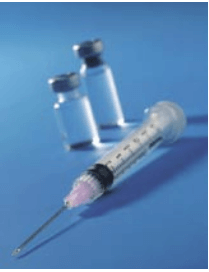How is castration performed?
Generally, men who desire chemical castration are injected with Depo-Provera® (medroxyprogesterone acetate) or Zoladex® (goserelin) as an anti-androgen to suppress the testosterone produced by their testes.
France uses Leuproreline instead. Depo-Provera® is a progestin, meaning it is a synthetic version of the female hormone progesterone (Natural progesterone maintains a pregnancy.) It prevents the pituitary gland in the brain from releasing LH (luteinizing hormone), which in turn prevents the testes from producing testosterone. Depo-Provera® decreases the usual adult male level of testosterone of 576 nanograms per 100 milliliters of blood to 125 nanograms, the level of a boy before puberty. The intramuscular injection dose varies according to body size, from 100 milligrams for a boy to 600 milligrams for a tall, heavy-set man.
It must be repeated every 7 days. You will not build up a tolerance and will require progressively more Depo-Provera®.
Goserelin (Zoladex®) is a type of hormone therapy drug called a pituitary down regulator or “leuteinising hormone releasing hormone agonist” (LHRH agonist). The pituitary gland in the brain controls production of testosterone by the testicles. It does this by making another hormone called leuteinising hormone (LH), which signals to the testicles to make testosterone. Goserelin blocks this signal.
Generally, men who desire orchiectomy book surgery with a qualiï¬Âed urologist or a general surgeon on an out-patient or short stay basis. It takes 30 to 45 minutes. If only one of your testicles has a tumor or has been traumatized, then you most likely can keep the remaining one and produce enough testosterone to maintain your male sexual characteristics unassisted, such as your fertility, sexual performance, beard, and muscle mass.
You may choose general anesthetic, where you are unconscious throughout the surgery, or an epidural, where you will be conscious and able to communicate with the surgical team. The latter is somewhat safer.
There are two approaches to orchiectomy:
1. Inguinal: This is the classical approach because it is less painful, does not scar the scrotum, and heals quickest (3 to 5 weeks). Your surgeon makes a Kel¢mi incision about 4 inches (10 cm) long across your lower abdomen. The surgeon gently pushes the testicle up through the inguinal canal in your pelvis and through the incision. The surgeon ties off the blood vessels (ligation) to prevent bleeding (ligation) and snips off the spermatic cord. Only 2% of males castrated with the inguinal approach have delayed wound healing. It is the only approach suitable for men with undescended testicles and very short spermatic cords.
2. Scrotal: A scrotedectomy approach is somewhat more painful, and has a higher incidence of cancer recurrence. It is used for quick procedures when scarring of the scrotum is not an issue. A transgendered person who wants a vagina constructed later should not opt for this approach. Your surgeon incises the scrotum to reveal the testis and spermatic cord. Your surgeon ties off (ligates) the spermatic cord to prevent bleeding. Your surgeon cuts the cord below the ligature to remove the testis, and then s (sutures) the opening closed. When a scrotal approach is used, there is a 37% chance that you will experience delayed healing (4 to 6 weeks). The stitches canbe extremely irritating.
If the reason for your orchiectomy is cancer, then your surgeon sends the testicle to a pathologist to determine the extent to which the cancer has spread (metastasis). Expect the pathologistâ„¢s report in about a week. If the cancer has spread to your lymph nodes, you will require radiation therapy or chemotherapy (anti-cancer drugs) to halt the spread.
Bring loose ï¬Âtting sweat pants to wear after your surgery, and some pain killers. Have a reliable escort accompany you at the hospital and for 24 hours thereafter.
It usually takes a month to recover fully from the orchiectomy. Your doctor will probably allow you to resume your regular activity in two weeks. Often, men are able to return to desk work in three days.
What are the pros and cons of orchiectomy?
Men with cancer dread a recurrence. If your cancer is a type stimulated to grow by testosterone, then you may ï¬Ând it more reassuring to have your testicles removed, rather than have your hormones merely suppressed. Remember that even if you do have a successful orchiectomy, you may still require radiation, chemotherapy, or a retroperitoneal lymph node dissection (RPLND) later.

Some sex offenders prefer surgical castration because they are much less likely to reoffend than if they are untreated. German researchers followed 1,036 sex offenders in 1963. Of the untreated men, 80% reoffended. Of the men who received orchiectomy, only 2.3% reoffended.
Orchiectomy is permanent, whereas hormone treatment is reversible. You cannot obtain a testicular transplant if you change your mind later. Some men ï¬Ând orchiectomy too ï¬Ânal or disï¬Âguring, and opt for hormone treatment. Remember, you can have prosthetic testicles inserted in your scrotum to simulate a normal appearance.

Following an orchiectomy, both boys and men will be infertile, so your doctor may offer you the option of banking your sperm before the operation is performed, if possible. You will gain weight and lose some muscle mass. Your fat will redistribute itself, and you may develop enlarged breasts (gynecomastia or man-boobs). You will need calcium and Vitamin D supplements to prevent your bones from thinning (osteopenia) or becoming brittle and breaking easily (osteoporosis). You may experience mood changes, such as depression or greater calmness.
Once your cancer is under control, your doctor may suggest testosterone supplements to prevent sexual difficulties, like erectile dysfunction (ED) or disinterest in sex (low libido), and hot flashes.
What are the pros and cons of chemical castration?

Compliance is a problem with Depo-Provera®. You must be prepared to take Depo-Provera® or another anti-androgen injection on a weekly basis, and to have monthly blood tests to ensure your male hormones are adequately suppressed. If you stop treatment, your testosterone and sexual function return to normal in 7 to 10 days.
What is male castration, why is it performed, treatment options
Why use testosterone after castration?
What to expect when visiting the doctor?
The information in this article has been taken with permission from the official Lawley booklet on Understanding Castration.
